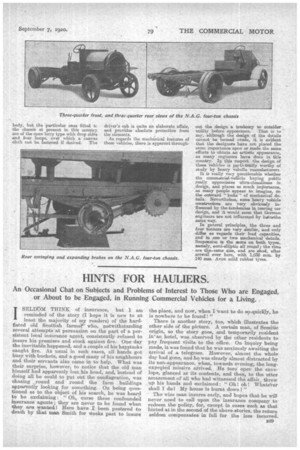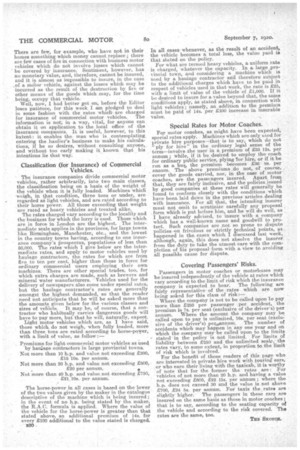HINTS FOR HAULIERS
Page 23

Page 24

If you've noticed an error in this article please click here to report it so we can fix it.
An Occasional Chat on Subjects and Problems of Interest to Those Who are Engaged, or About to be Engaged, in Running Commercial Vehicles for a Living.
SELDDM THINK of insurance, but I am reminded of the story (I hope it is new to at least the majority of my readers) of the hardfisted old Scottish farmer who, notwithstanding several attempts at persuasion on the part of a per_ sistent local insurance agent, consistently refused to insure his premises and stock against fire. One day the inevitable happened, and &couple of his haystacks caught fire. As usual in such cases, all hands got busy with buckets, and a good many of his neighbours and their servants also came in to help. What was their surprise, however, to notice that the old Man himself had apparently lost his head, and, instead of doing all he could to put out the conflagration, was chasing round and round the farm buildings apparently looking for something. On being questioned as to the object of his search, he was heard to be exclaiming: "Oh, curse these confounded insurance agents ; they are never to be found when they are ,wantedl Here have If been pestered to death by that man Smith for weeks past to insure the place, and now, when I want to do s9-quickly, he is nowhere to be found ! "
There is another story, too, which illustrates the other side of the picture. A certain man, of Semitic origin, so the story goes, and temporarily resident in'an hotel, was observed by the other residents to pay frequent visits to the office. On inquiry being made, it was found that he was anxiously awaiting the arrival of a telegram. However, almost the whole day had gone, and he was clearly almost distracted by its non-appearance, when, towards evening, the longexpeqted missive arrived._ He tore' open the envelope, glanced at its contents, and then, to the utter amazement of all who had witnessed the affaii, threw up his hands and exclaimed : " Oh I oh! Whate'ver shall I do? My house is burnt down ! "
The wise man insures early, and hopes that he will never need to call upon the insurance company to redeem the policy, for, except in cases such as that hinted at in the second of the above stories, the return seldom compensates in full for the loss incurred. There are few, for example, who have not in their homes something which money cannot replace ; there are few cases of fire in connection with business motor vehicles which do not involve losses which cannot be covered by insurance. Sentiment, however, has no monetary value, and, therefore, cannot be insured, and it is almost as impossible to insure, in the case .of a mo-tor vehicle, against the losses which may be incurred as the result of the destruction by fire or other means of the goods which may, for the time being, occupy that vehicle.
Well, now, I had better get on, before the Editor loses patience, for this week I am pledged to deal in some fashion with the rates which are charged for insurance of commercial motor vehicles. The information is not, in a. way, vital, for anyone can obtain it on application to the local office of the insurance companies. It is useful, however, to this bxtent : it enables the man who is contemplating entering the haulier's business to make his calculations, if he so desires, without consulting anyone, and without too early making it known that his intentions lie that way.
Classification (for Insurance) of Commercial Vehicles.
The insurance companies divide commercial motor vehicles, rather arbitrarily, into two main classes, the classification being on a basis of the weight of the vehicle when it is fully loaded. Machines which weigh, in that condition, three tons or under, are regarded as light vehicles, and are rated according to their horse power. All those exceeding that weight are rated as heavy vehicles and treated alike.
The rates charged vary according to the locality and the business for which the lorry is used. Those which are in force in London are the highest. The intermediate scale applies in the provinces, for large towns like Birmingham, Manchester, etc., and the lowest in the country, towns having, according to one insurance company s firospectus, populations of less than 50,000. The rates which I give below are the intermediate rates, and apply to motor vehicles used by haulage contractors, the rates for which are from five to ten per cent, higher than those in force for ordinary commercial users employing their own machines. There are other special trades, too, for which extra charges are made, such as brewers and mineral water manufacturers. Vehicles used for the delivery of newspapers also come under special rates, but the haulage contractor's rates are generally amongst the highest demanded, so that the reader need not anticipate that he will be asked more than the amounts given below for the various classes and sizes of vehicle. It may be, of course, that a contractor who habitually carries dangerous goods will have to pay more, but that he will, naturally, expect.
Light motor vehicles which are, as I have said, those which do not weigh, when fully loaded, more than three tons are rated according to horse-power, with a limit of value, as follow :— Premiums for light commercial motor vehicles as used by haulage contractors in large provincial towns. Not more than 10 h.p. and value not exceeding 2300, 215 10s. per annum. Not more than 20 h.p. and value not exceeding 2500, 220 per annum. • Not more than 40 h.p. and value not exceeding 2750, 221.103. per annum.
The horse-power in all cases is based On the lower of the two values given by the maker in the catalogue descriptive of the machine which is being insured ; in the event of no h.p. being stated by the maker, the R.A.C. formula is applied. Where the value of the vehicle for the horse-power is greater than that stated above, an additional premium of 14s. for every 2100 additional to the value stated is charged. B30 ,
In all eases whenever, as the result of an accident, the vehicle becomes a total loss, the value paid 1B that stated on the policy. For what are termed heavy vehicles, a uniform rate is charged, whatever the capacity. In a large...provincial towe, and considering a machine which is used by a haulage contractor and therefore sulaject to the additional charges which have to be paid in respect of vehicles used in that work, the rate is 225, witha limit of value of the vehicle of 21,000. If it be desired to insure for a value beyond that, the same conditions apply, as stated above, in connection with light vehicles ; namelY, an addition to the premium insurable
value. be paid of 14s. per 2100 increase in value. Special Rates for Motor Coaches.
For motor coaches, s might have been expected, special rates apply. Machines which are only used for private hire purposes—that is to say, which do not
ply for hire" in the ordinary legal sense of the term—involve the user in a premium of 233 12s. per annum; while, if it be desired to employ the coach for ordinary public service, plying or hire or if it be run as a bus, the premium becomes 246 8s. per annum. The above premiums ,do not, of course, cover the goods carried, nor, in the case of motor coaches, are the pa.sssngers insured. Apart from that, they are fairly inclusive, and the policies issued by good companies at these rates will generally be found to conform closely with the conditions. which have been laid down in the previous articles dealing with insurance. For all that, the intending insurer must not omit to scrutinize carefully any proposal form which is put before him, and he will do well, as I have already advised, to insure with a company which has a well-known name and goodwill to protect. Such companies are not so prone to dispute policies on frivolous or strictly technical points, as happened in the cases which I discussed last week, although, again, this does not absolve the insurer from the duty to take the utmost care with the completion of his proposalform with a view to avoiding all possible cause for dispute.
. Covering Passengers' Risks.
Passengers in motor coaches or motorbuses may be insured independently of the vehicle at rates which vary according to the limit of risk which the insurance company is expected to bear. The following are fairly representative of the rates which are now being asked for this class of risk:— Where the company is not to be called upon 'to pay
more than 2250 per passenger per accident, the premium is 7s. per seat (exclusive of the driver's) per annum. Where the amount the company may he called upon to pay is unlimited, 16s. per seat (exclusive of the driver's) peroa,nnuni. The number of accidents which may happen in any one year and on which the company may be called upon to the limits
stated in the policy is not limited. For limits of liability between 2250 and the unlimited scale, the rates vaxy, to some extent, in proportion to the limit of risk which is involved.
For the benefit of those readers of this page who
are interested in private hire work with touring ears, or who earn their living with the taxicab, it is worthy of note that for the former the rates are : For vehicles of not more than 20 h.p. and having a value not exceeding 2600, 222 15s. per annum ; where the h.p. does not exceed 30 and the value is not above 2700, 224 5s. per annum. For taxis the rates are slightly higher. The passengers in these cars are insured on the same basis as those in motor coaches ; that is to say, according to the seating capacity of the vehicle and according to the risk covered. The rates are the same, too.
TB s Slcarau.




























